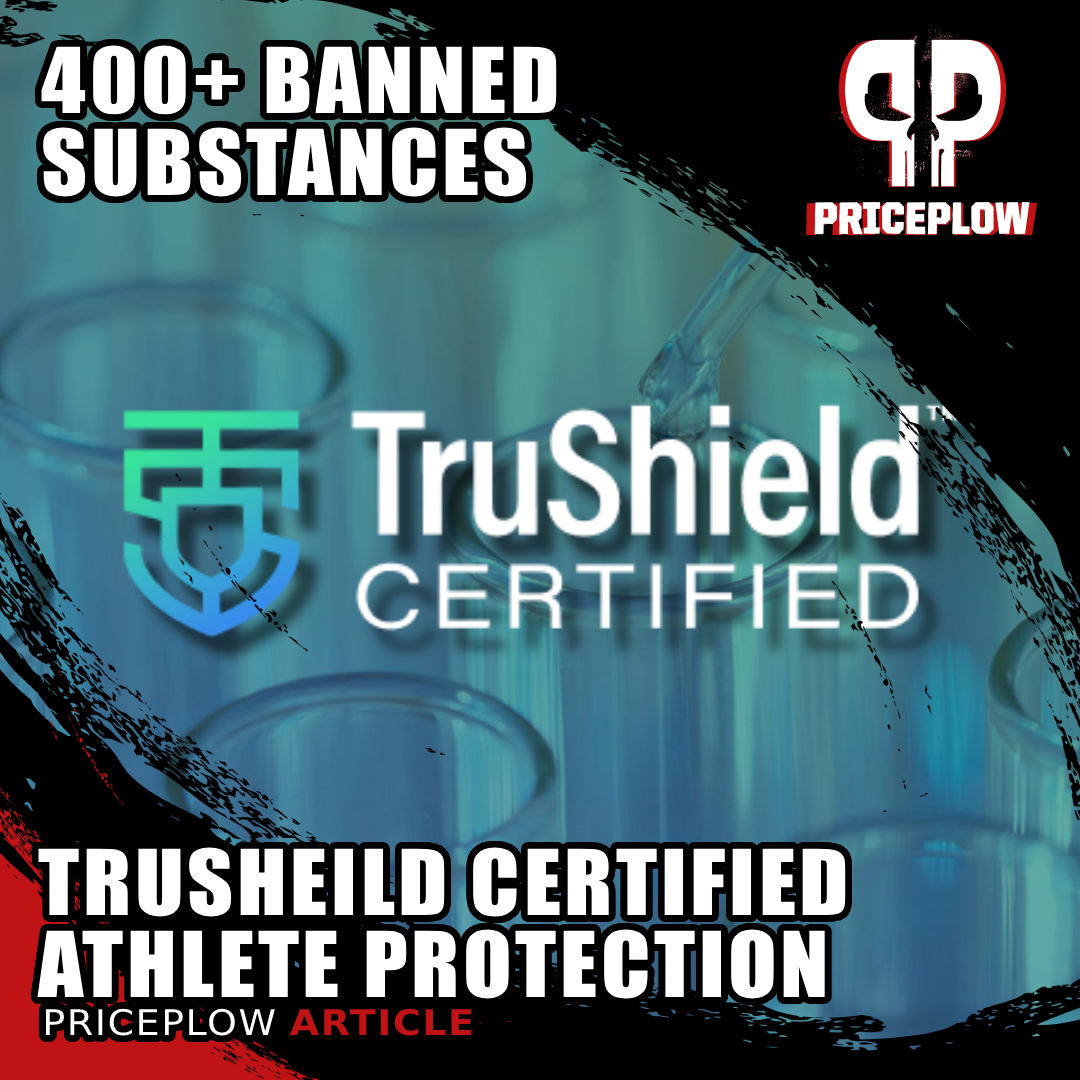
TruShield™ Certified brings WADA-level banned substance testing to supplements. Led by Lori Bestervelt (who created NSF 173 & Certified for Sport), it tests for 400+ banned substances using the same lab sports organizations trust when athletes test positive.
When CON-CRĒT, the brand known for its patented creatine hydrochloride, needed banned substance certification for its product line, founder Mark Faulkner didn't choose just any testing program. Faulkner, who co-founded Aegis Sciences Corporation (one of the industry's early anti-doping labs), knew exactly what rigorous testing looks like. He chose TruShield™ Certified, a new certification program from the same lab that major professional sports organizations trust when their athletes test positive.
That choice reflects what TruShield™ Certified represents: a new certification program built on over 20 years of WADA-level anti-doping expertise, testing for 400+ banned substances using methodologies developed for professional sports organizations.
Unlike bundled certification programs that combine multiple services, TruShield focuses exclusively on comprehensive banned substance testing, allowing brands to add elite-level screening without duplicating existing quality systems. The program tests every production batch using the same ISO 17025 protocols and WADA reference standards that protect Olympic and professional athletes.
TruShield™ Certified: Premier Certification for Athletes, Teams, Leagues, and Caring Consumers
To a high-level athlete, the stakes are as high as they come. Athletes risk disqualification, loss of sponsorships, and damaged reputations if a banned substance appears in their system, even at trace levels. Research has repeatedly shown that some finished products contain low levels of steroids, stimulants, or other prohibited substances, often from cross-contamination during manufacturing. For professional and Olympic athletes, the difference between a clean certification and a generic quality check can mean the difference between competing and being banned.
Leading TruShield™ is Lori Bestervelt, who spent 22 years as Chief Science Officer at NSF International, where she created NSF Certified for Sport and the NSF 173 standard -- programs that defined banned substance testing for an entire generation of supplements. With a PhD in Toxicology from the University of Michigan and a background as both a sports dietitian and competitive athlete, Bestervelt recognized gaps in existing certification programs and saw an opportunity to build something more comprehensive, more flexible, and more aligned with what elite athletes actually need.
The result is a certification program that tests for over 400 banned substances (including entire drug classes that other programs miss) using the same ISO 17025 methodologies and WADA reference standards that professional sports organizations rely on.
This article explains the methods and background behind Bestervelt's science-backed TruShield™ Certified approach. Before we go further, subscribe to PricePlow's TruShield™ news alerts to stay updated on certified products, industry developments, and upcoming content with the TruShield™ team:
Subscribe to PricePlow's Newsletter and TruShield™ Certified Alerts
The Expert Behind the Certification: Lori Bestervelt's 20+ Year Journey
If anyone understands both the science of banned substance testing and the real-world needs of athletes, it's Lori Bestervelt. Her path to creating TruShield began long before she became one of the supplement industry's most influential figures -- it started in the pool.
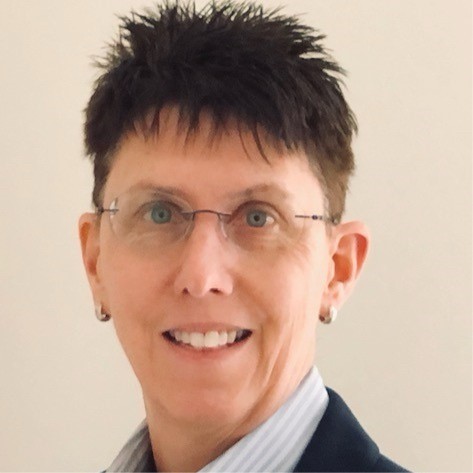
Lori Bestervelt, the scientist behind the certification spent over two decades at NSF International, where she authored the industry's foundational supplement testing standards before launching this new program.
As a lifelong competitive swimmer and later a triathlete, Bestervelt experienced firsthand the frustration athletes faced in the pre-internet era when trying to determine which supplements were legitimate and safe. "It was really hard to figure out what was legit," she recalls. "You had to do a lot of research, call people up and ask questions. It was really flaky." That experience planted a seed: if her career ever took her to a position where she could make it easier for athletes, coaches, and dietitians to identify safe supplements, she would do it.
She spent years building the scientific foundation to make that vision possible. After earning her PhD in Toxicology from the University of Michigan, she completed postdoctoral work in drug metabolism and P450 enzyme systems. Lori began her career as a toxicologist at Parke-Davis, analyzing the effects of new drugs under development, before joining NSF International in 1997 as Director of Toxicology.
Creating the Standards That Defined an Industry
"I got the industry together," Bestervelt explains, "and I wrote NSF 173."
Bestervelt's career trajectory at NSF was remarkable, but her most lasting impact came in the early 2000s, when she recognized an opportunity to create something the supplement industry desperately needed. At that time, there were no Good Manufacturing Practices (GMPs) specific to supplements, minimal contaminant testing, and virtually no systematic approach to banned substance screening. "I got the industry together," Bestervelt explains, "and I wrote NSF 173."
NSF/ANSI 173 established comprehensive standards for dietary supplement testing, including GMPs, label claim verification, contaminant testing (pesticides, heavy metals, microbiological), and banned substance screening.[1] When sports organizations approached her asking if banned substance testing could be added, she created NSF Certified for Sport -- the program that would become a gold standard for athlete-safe supplements.
Recognizing the Gaps
After 22 years at NSF, Bestervelt left in 2019 to explore digital platforms and supply chain transparency, working with organizations focused on chemical safety and product traceability. During this time, she stayed connected to the anti-doping world through advisory roles with the Partnership for Clean Competition and The Riverside Company's Testing Inspection Certification Compliance division.
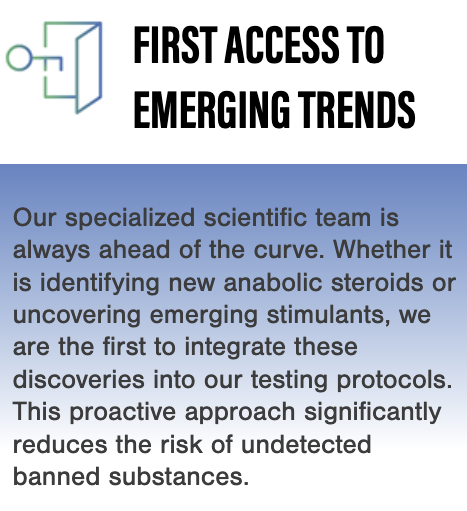
The scientific team identifies and integrates newly discovered performance enhancers into screening panels before they become widespread threats to athletes.
What she kept hearing from the industry was a consistent theme: companies wanted more flexibility in their certification programs. Many had invested in great quality management systems, used reputable third-party labs for GMPs and contaminant testing, but needed elite-level banned substance certification without redundant bundled services. Smaller innovative brands struggled with program costs. And critically, the substance lists used by most certification programs hadn't kept pace with emerging compounds that WADA-experienced laboratories were identifying.
The opportunity became clear: create a certification program with singular focus on what matters most to athletes -- comprehensive banned substance testing -- while offering the flexibility and scientific rigor the market needed.
Partnering with the Lab Sports Organizations Trust
In November 2024, Bestervelt joined Sports Medicine Research and Testing Laboratory (SMRTL) as Senior Vice President of Certification Services to launch TruShield™ Certified under SMRTL's subsidiary EagleDX. The partnership made perfect sense: SMRTL had spent over two decades as one of only two WADA-experienced anti-doping laboratories in the United States, testing blood and urine samples for major professional sports organizations. When athletes tested positive and supplements needed investigation, sports organizations sent them to SMRTL's lab.
Now, Bestervelt could leverage that expertise, along with access to exclusive WADA reference standards and cutting-edge ISO 17025 methodologies, to build a certification program that would address every gap she'd identified over her career.
"This is very much a more relevant, streamlined certification program," Bestervelt notes. "No other certification program can offer what we offer. We're the only ones."
When Athletes Fail Tests, This Is the Lab Sports Organizations Trust
For over two decades, Sports Medicine Research and Testing Laboratory (SMRTL) has conducted blood and urine testing for major professional sports leagues, Olympic athletes, and elite competitors. When an athlete tests positive for a banned substance and a supplement is implicated, sports organizations send samples to SMRTL's laboratory for analysis.
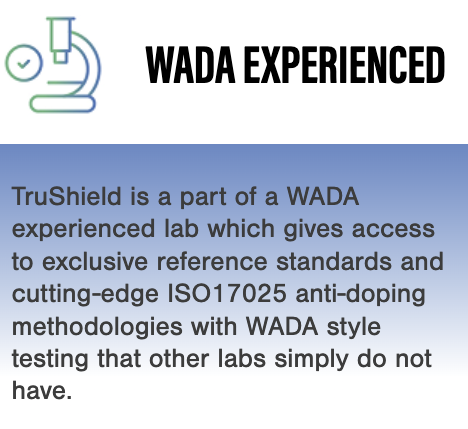
WADA-experienced lab access gives the certification restricted reference materials and advanced anti-doping protocols.
"When someone pops," explains Thane Campbell, COO of SMRTL, "they're not sending those supplements over to other certification programs. They're sending it to the SMRTL lab, because they trust them."
That trust stems from SMRTL's experience analyzing cases where trace contamination at parts per billion has led to positive tests. The lab's scientists use the same methodologies, reference standards, and detection protocols developed for elite athlete testing. As a WADA-experienced laboratory, SMRTL has access to exclusive reference standards for emerging banned substances and maintains ISO 17025 anti-doping methodologies that general testing labs don't typically possess.
This expertise in identifying new anabolic steroids and emerging stimulants before they become widespread informs TruShield's comprehensive testing approach.
Why TruShield Is a Separate Entity
WADA requirements prohibit accredited laboratories from directly certifying commercial products. To maintain the integrity of anti-doping work, SMRTL created EagleDX as a subsidiary, which operates TruShield™ Certified as a separate entity. This structure allows SMRTL to continue athlete testing while TruShield brings the same methodologies and expertise to supplement certification.
The connection is clear: TruShield leverages the knowledge base, reference standards, and testing protocols from a laboratory that sports organizations trust when careers are on the line.
What Makes TruShield's Testing Different
The supplement industry has several established certification programs, each serving important roles in quality assurance. TruShield doesn't aim to replace these programs, it aims to provide the most comprehensive banned substance testing available, with a level of rigor that matches what professional sports organizations require.
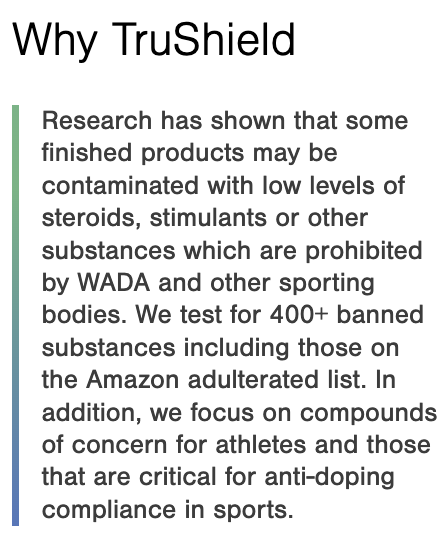
Supplement contamination remains a real concern for competitive athletes, which is why this certification program screens for over 400 prohibited compounds that could jeopardize careers.
Testing for 400+ Banned Substances
Most certification programs in the market test for approximately 300 banned substances. TruShield tests for over 400, with that number continuously expanding as new compounds emerge. This isn't just a numbers game though, it's about covering entire drug classes that other programs overlook.
For example, glucocorticoids are a class of corticosteroids that can enhance performance and are prohibited by WADA in competition. HIF stabilizers (hypoxia-inducible factor stabilizers) represent an emerging category of performance enhancers that manipulate the body's response to low oxygen levels. These substance classes appear on WADA's prohibited list, yet many certification programs don't include them in routine screening.
"There's whole categories that these other programs don't test for," Bestervelt explains. "You're leaving open a risk for the athlete, for the brand. We're trying to fill that gap."
The difference comes down to expertise and access. SMRTL's scientists work daily with the WADA prohibited substance list, analyzing blood and urine samples from elite athletes. They know which compounds are being used, which new substances are entering the market, and which categories represent the greatest risk. That knowledge directly informs TruShield's testing protocols.
Banned Substance Testing and ONLY Banned Substance Testing
Unlike bundled certification programs that combine GMPs, label claim verification, contaminant testing, and banned substance screening into a single package, TruShield maintains a singular focus: banned substances. This approach recognizes that many companies already have robust quality management systems, work with reputable labs for GMPs and contaminant testing, but need elite-level banned substance certification without paying for redundant services.
"We're designed to complement and not duplicate," Bestervelt notes. "Our scope is very focused."
This flexibility matters for brands of all sizes. Smaller innovative companies can access world-class banned substance testing without the financial burden of complete recertification. This means that established brands using other services for GMPs or contaminant testing can add TruShield's comprehensive banned substance screening without disrupting existing quality programs.
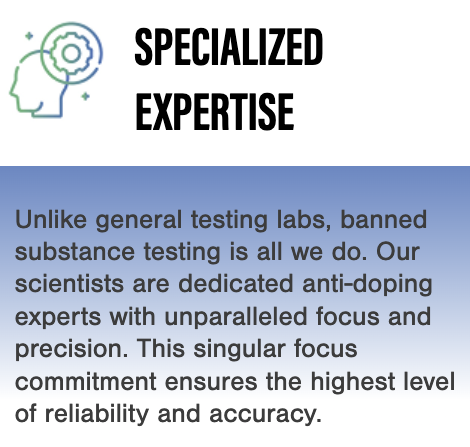
The program employs scientists who exclusively focus on identifying prohibited substances, bringing unmatched precision to athlete protection.
Access to Exclusive WADA Reference Standards
As part of a WADA-experienced laboratory, TruShield has access to exclusive reference standards and the latest ISO 17025 anti-doping methodologies that general testing labs simply don't possess. These materials are most often restricted to labs actively engaged in anti-doping work.
This access enables TruShield's scientists to stay ahead of emerging threats. Whether it's identifying new anabolic steroids or uncovering novel stimulants, TruShield integrates these discoveries into testing protocols proactively, reducing the risk that products will contain undetected banned substances that could end an athlete's career.
The goal isn't just to test for what's been a problem, it's to identify what might become a problem before athletes test positive.
Beyond Traditional Sports Supplements
Athletes don't only use protein powders and pre-workouts. They consume functional foods and beverages, apply topical products for recovery, and use various finished products throughout training and competition. Yet many certification programs focus exclusively on traditional dietary supplements, leaving a gap in athlete protection.
TruShield's flexible approach recognizes this reality. The program certifies:
- Nutritional Ingredients
- Dietary supplements (traditional sports nutrition products)
- Functional foods and beverages
- Topical products (like Vireo's Amino Activ topical cream)
"We're not focused on just sports supplements," Bestervelt explains. "We understand that athletes take all kinds of finished products. Having the ability to certify different types of finished products opens the door for more comprehensive athlete protection."
This flexibility addresses feedback from sports organizations who know their athletes use diverse products but have struggled to find certification options beyond traditional supplement categories. TruShield's scope extends to any finished product where banned substance testing matters... which, for elite athletes, is virtually everything they consume or apply.
The TruShield Certification Process
TruShield's certification follows a straightforward five-step process designed for efficiency without compromising rigor:
- Application Materials: Companies receive a program package and certification contract detailing requirements and logo usage guidelines. Product labels are submitted for approval. Products cannot display the TruShield logo until all certification steps are complete.
- Sample Request: A minimum of three finished product samples from each batch/lot are submitted to SMRTL's ISO 17025 laboratory for testing. An additional sample from each batch is retained for secure storage.
- Product Testing: Each production batch/lot undergoes testing for 400+ WADA-banned substances using the lab's anti-doping methodologies.
- Test Results: Detailed reports summarizing the analysis of each batch/lot are provided to member companies, confirming compliance with TruShield standards and WADA's prohibited substance list.
- Certification: After successful completion, the TruShield mark can appear on product labels. Every tested batch/lot is displayed on the TruShield website for public verification.
Batch-by-Batch Testing and Transparency
Unlike one-time product certification, TruShield requires testing for every production batch or lot. This ongoing approach ensures that every unit reaching consumers has been verified, not just an initial sample. It's the same philosophy used in anti-doping testing: consistent vigilance.
What "Only Banned Substance Testing" Means
TruShield doesn't duplicate GMPs, label claim verification, or general contaminant testing that companies may already have in place through other providers. The program focuses exclusively on what it does best: comprehensive banned substance screening using WADA-level methodologies. Companies maintain control over their quality programs while adding elite-level banned substance certification where it matters most.
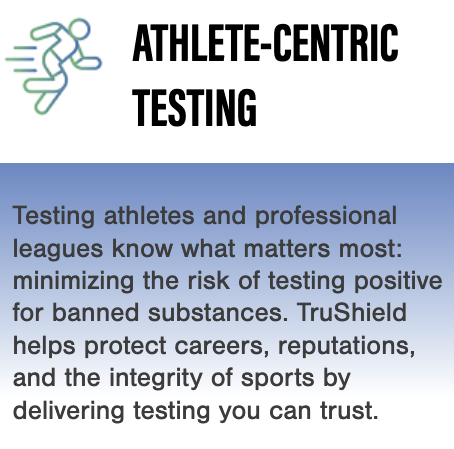
Professional and Olympic competitors need assurance their supplements won't trigger positive tests, making rigorous certification essential for protecting reputations and livelihoods.
Early Adopters: Brands Building Trust
CON-CRĒT's decision to certify with TruShield wasn't made lightly. Founder Mark Faulkner co-created Aegis Sciences Corporation, one of the industry's pioneering anti-doping laboratories, giving him deep knowledge of what rigorous banned substance testing requires. When he encountered TruShield, combining SMRTL's WADA-experienced laboratory with Bestervelt's expertise, he recognized it as what he called "a match made in heaven."
CON-CRĒT: When Expertise Recognizes Expertise
For Faulkner, the decision centered on protecting athletes who use CON-CRĒT products. "What's important to him is making sure that the products he makes and athletes are using are protected in the most rigorous and comprehensive way for banned substance testing," Bestervelt notes. CON-CRĒT's flagship creatine products now carry the TruShield certification, demonstrating the brand's commitment to athlete safety.
RedLeaf Biologics - The First Certified Ingredient
Another early adopter is RedLeaf Biologics, who has the first ingredient certification through TruShield, and will be pursuing certification for their sports nutrition targeted ingredients.
Vireo and Beyond
Vireo chose TruShield to certify their innovative Amino Activ topical product, demonstrating the program's flexibility beyond traditional supplements. Thanks to Faulkner's industry experience, Vireo recognized TruShield's comprehensive approach to banned substance testing.
Other early adopters include No Name and several other brands currently in the certification pipeline. What these companies share is recognition that comprehensive banned substance testing matters more than ever, and that testing aligned with professional sports standards provides both athlete protection and competitive differentiation.
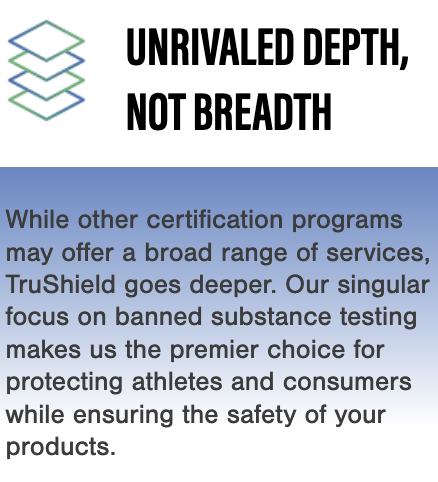
Rather than bundling multiple services, the program concentrates exclusively on comprehensive prohibited substance screening, complementing existing quality systems.
The common thread among early adopters isn't company size or product category. It's understanding that when athlete safety and brand reputation are at stake, the depth of testing matters as much as the certification itself.
What This Means for Athletes, Brands, and Consumers
Protection for Professional and Olympic Athletes
For athletes competing under anti-doping programs, TruShield certification provides critical protection. Testing positive for a banned substance (even from unintentional contamination) can result in suspension, loss of sponsorships, stripped medals, and permanent career damage. TruShield's comprehensive testing using the same methodologies that professional sports organizations rely on minimizes this risk.
Athletes, coaches, and dietitians can verify specific batch numbers on TruShield's website, ensuring the exact product they're using has been tested. This transparency matters when careers depend on what goes into the body.
Brand Differentiation and Market Access
In a crowded supplement market, TruShield certification offers brands a meaningful way to stand out. It signals commitment to athlete safety through testing aligned with professional sports standards, not just general quality checks.
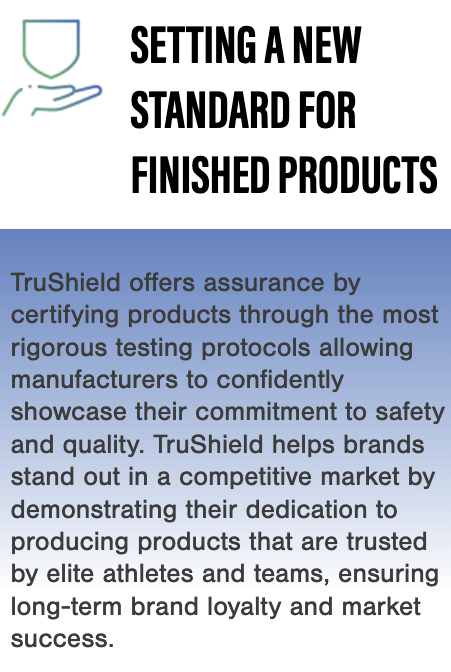
Brands can differentiate themselves through certification backed by testing protocols used by professional sports organizations, building consumer confidence and market position.
For brands targeting elite athletes, sports organizations, or team sponsorships, TruShield certification shows the level of rigor these partnerships require. It's not just about meeting minimum standards, it's about exceeding them with the most intense banned substance testing available.
Consumer Confidence and Long-Term Reputation
Consumer trust is hard to build and easy to lose. A single contamination incident that leads to an athlete's positive test can damage a brand's reputation for years. TruShield's batch-by-batch testing approach, transparent results, and comprehensive substance screening help brands protect what they've built.
For consumers who follow sports and understand anti-doping concerns -- whether they're competitive athletes themselves, informed buyers, or parents of student-athletes -- TruShield certification provides confidence that products have been tested with the same rigor used to protect professional and Olympic competition.
The investment in this level of testing isn't just about meeting today's standards. It's about protecting reputations for the long term, and catching ingredients before they're even known to the public.
Conclusion: The Future of Banned Substance Testing
TruShield™ Certified enters the market at a critical moment. As anti-doping standards evolve and new banned substances emerge, athletes need protection that goes beyond basic certification. TruShield provides that protection through comprehensive testing backed by a WADA-experienced laboratory, methodologies used by professional sports organizations, and expertise from the scientist who created the industry's foundational standards.
The program's singular focus on banned substances, testing for 400+ compounds including entirely new drug classes, brings a shift in how the industry can approach athlete safety. Rather than forcing brands into bundled programs that duplicate existing quality systems, TruShield offers elite-level banned substance certification that complements and enhances what companies already have in place.
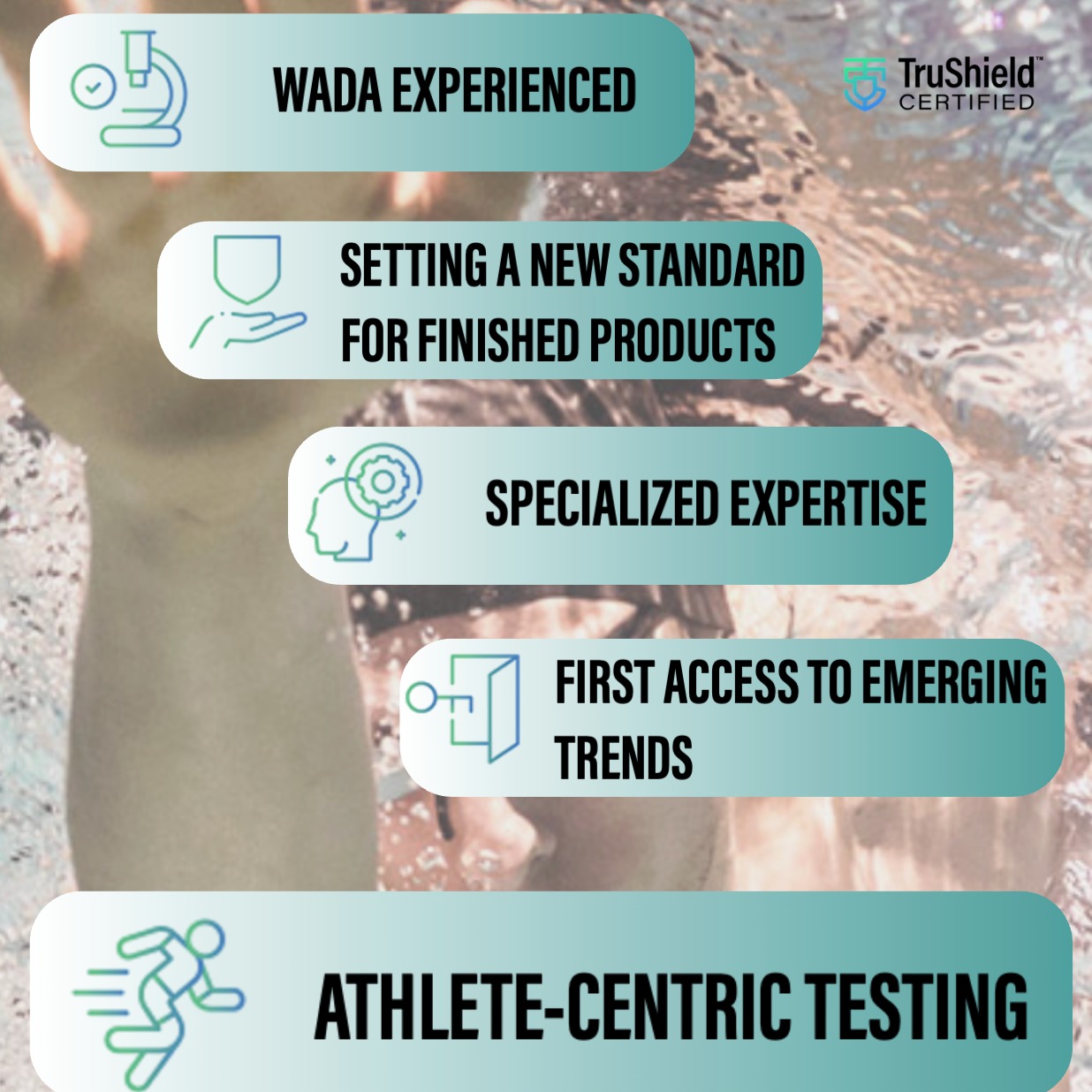
WADA-experienced lab access, elevated product standards, dedicated scientists, early threat detection, and athlete-first approach.
For brands serious about protecting athletes and building long-term trust, TruShield certification demonstrates commitment to the highest testing standards available. Early adopters like CON-CRĒT and Vireo recognized this value, and the program continues expanding as more companies prioritize comprehensive banned substance screening.
What's Next
We'll be diving deeper into TruShield's work in upcoming content. Look for a podcast conversation with Lori Bestervelt exploring the science behind banned substance testing, emerging compound classes like HIF stabilizers, and what makes WADA-level testing different from standard certification. We'll also examine specific substance categories that other programs overlook and why comprehensive testing matters more than ever for athlete protection.
For Brands Interested in Certification
Companies interested in TruShield certification can visit TruShield™ Certified to learn more about the program, review certified products, and explore the certification process. Whether you're launching new products or seeking to enhance existing quality programs with comprehensive banned substance testing, TruShield offers the expertise and rigor that elite athletes and sports organizations trust.
Subscribe below to stay updated on TruShield developments, newly certified products, and upcoming deep-dives into banned substance testing:

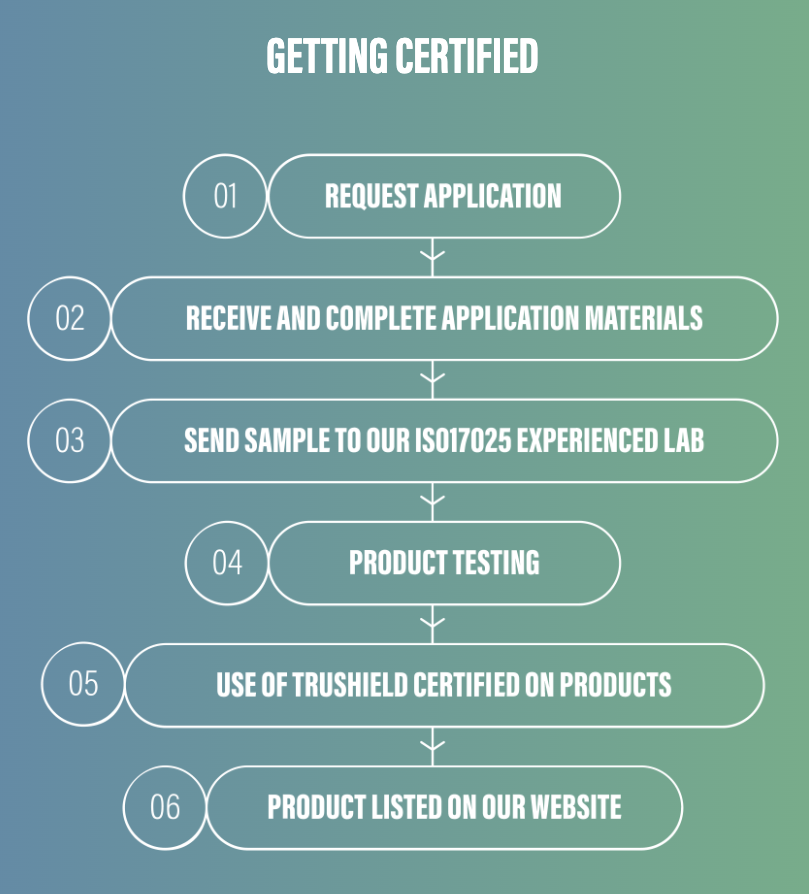


Comments and Discussion (Powered by the PricePlow Forum)